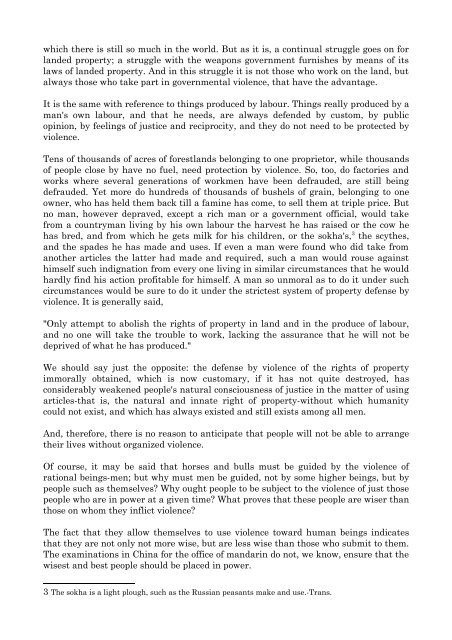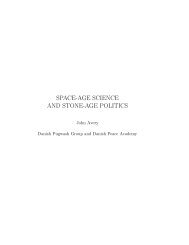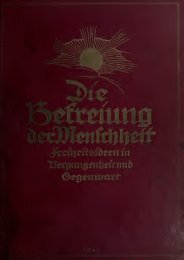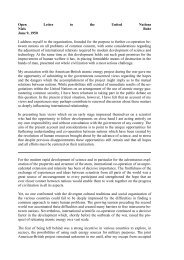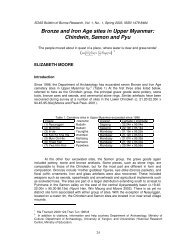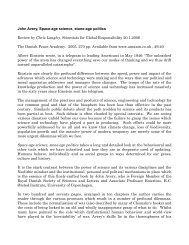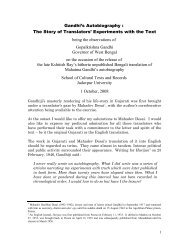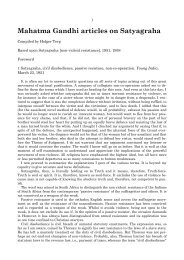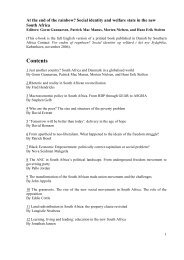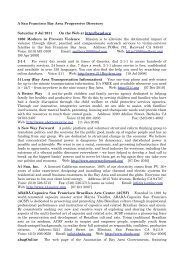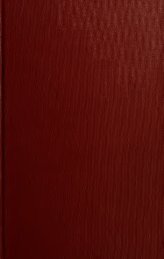THE SLAVERY OF OUR TIMES PREFACE / INTRODUCTION
THE SLAVERY OF OUR TIMES PREFACE / INTRODUCTION
THE SLAVERY OF OUR TIMES PREFACE / INTRODUCTION
You also want an ePaper? Increase the reach of your titles
YUMPU automatically turns print PDFs into web optimized ePapers that Google loves.
which there is still so much in the world. But as it is, a continual struggle goes on for<br />
landed property; a struggle with the weapons government furnishes by means of its<br />
laws of landed property. And in this struggle it is not those who work on the land, but<br />
always those who take part in governmental violence, that have the advantage.<br />
It is the same with reference to things produced by labour. Things really produced by a<br />
man's own labour, and that he needs, are always defended by custom, by public<br />
opinion, by feelings of justice and reciprocity, and they do not need to be protected by<br />
violence.<br />
Tens of thousands of acres of forestlands belonging to one proprietor, while thousands<br />
of people close by have no fuel, need protection by violence. So, too, do factories and<br />
works where several generations of workmen have been defrauded, are still being<br />
defrauded. Yet more do hundreds of thousands of bushels of grain, belonging to one<br />
owner, who has held them back till a famine has come, to sell them at triple price. But<br />
no man, however depraved, except a rich man or a government official, would take<br />
from a countryman living by his own labour the harvest he has raised or the cow he<br />
has bred, and from which he gets milk for his children, or the sokha's, 3 the scythes,<br />
and the spades he has made and uses. If even a man were found who did take from<br />
another articles the latter had made and required, such a man would rouse against<br />
himself such indignation from every one living in similar circumstances that he would<br />
hardly find his action profitable for himself. A man so unmoral as to do it under such<br />
circumstances would be sure to do it under the strictest system of property defense by<br />
violence. It is generally said,<br />
"Only attempt to abolish the rights of property in land and in the produce of labour,<br />
and no one will take the trouble to work, lacking the assurance that he will not be<br />
deprived of what he has produced."<br />
We should say just the opposite: the defense by violence of the rights of property<br />
immorally obtained, which is now customary, if it has not quite destroyed, has<br />
considerably weakened people's natural consciousness of justice in the matter of using<br />
articles-that is, the natural and innate right of property-without which humanity<br />
could not exist, and which has always existed and still exists among all men.<br />
And, therefore, there is no reason to anticipate that people will not be able to arrange<br />
their lives without organized violence.<br />
Of course, it may be said that horses and bulls must be guided by the violence of<br />
rational beings-men; but why must men be guided, not by some higher beings, but by<br />
people such as themselves? Why ought people to be subject to the violence of just those<br />
people who are in power at a given time? What proves that these people are wiser than<br />
those on whom they inflict violence?<br />
The fact that they allow themselves to use violence toward human beings indicates<br />
that they are not only not more wise, but are less wise than those who submit to them.<br />
The examinations in China for the office of mandarin do not, we know, ensure that the<br />
wisest and best people should be placed in power.<br />
3 The sokha is a light plough, such as the Russian peasants make and use.-Trans.


